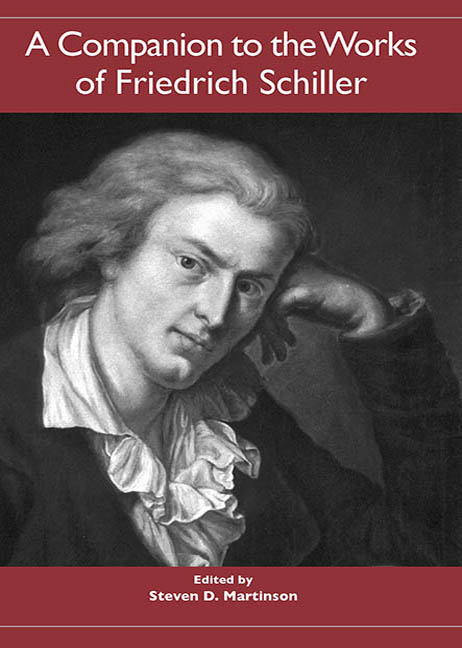Book contents
- Frontmatter
- Dedication
- Contents
- Acknowledgments
- The Works of Friedrich Schiller
- Editions and Abbreviations
- Introduction: Schiller and the New Century
- Intellectual-Historical Settings
- Major Writings
- Die Räuber: Structure, Models, and an Emblem
- Kabale und Liebe Reconsidered
- Great Emotions — Great Criminals?: Schiller's Don Carlos
- Concerning Aesthetic Education
- “On the Shores of Philosophy”: Schiller's Lyric Poetry, 1795
- Wallenstein
- Maria Stuart: Physiology and Politics
- Die Jungfrau von Orleans
- Wilhelm Tell
- Schiller's Legacy
- Works Cited
- Notes on the Contributors
- Index
Maria Stuart: Physiology and Politics
from Major Writings
Published online by Cambridge University Press: 28 April 2017
- Frontmatter
- Dedication
- Contents
- Acknowledgments
- The Works of Friedrich Schiller
- Editions and Abbreviations
- Introduction: Schiller and the New Century
- Intellectual-Historical Settings
- Major Writings
- Die Räuber: Structure, Models, and an Emblem
- Kabale und Liebe Reconsidered
- Great Emotions — Great Criminals?: Schiller's Don Carlos
- Concerning Aesthetic Education
- “On the Shores of Philosophy”: Schiller's Lyric Poetry, 1795
- Wallenstein
- Maria Stuart: Physiology and Politics
- Die Jungfrau von Orleans
- Wilhelm Tell
- Schiller's Legacy
- Works Cited
- Notes on the Contributors
- Index
Summary
In His First Medical DissertationPhilosophie der Physiologie (Philosophy of Physiology, 1779), Johann Friedrich Schiller asserted that philosophy and religion can overpower the “animal,” that is, corporeal sensations, and tear (reißen) the soul away from mere agreement, that is, identification with matter. Even though it has not been enlisted to do so in the past, Schiller's early medical writing would seem to support the traditional reading of Maria Stuart. Queen Mary absolves herself of the sins of the past, attains a state of sublimity, and marches triumphantly to her death. Through this chain of events, she achieves the final victory over death, to say nothing of her opponent, Queen Elizabeth. Or, so it would seem. In fact, the sustained and, at times, profound impact of Schiller's early medical dissertations on his later works suggests a quite different interpretation, one that is also at variance with the most recent scholarship.
The present undertaking expands my reading of Schiller's Maria Stuart in my book Harmonious Tensions: The Writings of Friedrich Schiller (1996). It is my purpose here to explore the relationship between physiology and politics in Maria Stuart. I will also cast further light on the drama by showing how it interrelates with a number of other works by Schiller. A close analysis of gender roles and the relationship between Elizabeth and Mary rounds out the discussion.
The Interaction Between Mind and Body
At the beginning of his career as a writer, Friedrich Schiller appreciated the vital roles that moments of crisis and rupture can play in the restoration and maintenance of health, not only in the body and the mind but also in the multifarious relationships between individuals and society. In the second of his medical dissertations (Abschlußarbeiten), for example, the young student of medicine observed that in the case of fevers, nature combats nature. In moments of crisis, the individual finds himself at the crossroads of illness and health, or life and death. If this state of being is prolonged, however, any further disruption, that is, rupture (Riß) will lead to the complete collapse and destruction of the body. Nonetheless, when explaining the nature of fevers, Schiller sees that the crisis of our physical being in moments of illness can also lead to a restoration of health.
- Type
- Chapter
- Information
- A Companion to the Works of Friedrich Schiller , pp. 213 - 226Publisher: Boydell & BrewerPrint publication year: 2005



